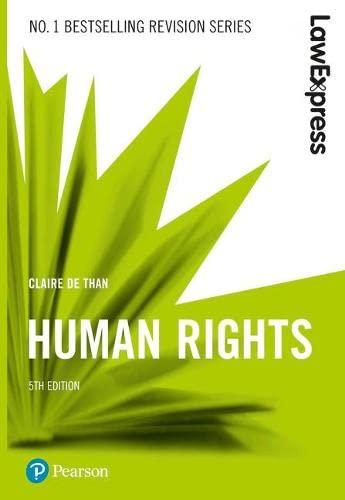Question
Mistake and a Babe Ruth Baseball Card Introduction: When two people talk to each other in the hope that an exchange will take place, all
Mistake and a Babe Ruth Baseball Card
Introduction:
When two people talk to each other in the hope that an exchange will take place, all kinds of things can go wrong. To make business transactions smoother and more dependable, the law has developed rules about when an agreement between two parties is enforceable. Rules of genuine assent address whether parties to a contract consented to a bargained-for exchange.
Concept Review:
When people agree to buy or sell, they do so with a particular understanding about the nature of the good or service they are about to exchange. However, one or both parties may think they consented to exchange a particular thing, only to find out later that no meeting of the minds had occurred. People may misunderstand either some fact about the deal or the value of what is being exchanged. In other words, one or more parties may have made a mistake regarding the contract when they entered into it.
Misunderstandings about the facts underlying a contract may raise the potential for rescission of a contract. Legal assent is absent when a legal mistake occurs. Mistake, as understood in contract law, is an erroneous belief about the facts of a contract at the time the contract is concluded. Mistakes may be unilateral or mutual.
Case:
Please watch the video, Visalia man believes his $2 Babe Ruth baseball card is worth millions(Links to an external site.).
Please read the New York Times case, "Babe Ruth card bought for $2 could be worth millions(Links to an external site.)."
1. Discuss the effect that a unilateral mistake of fact has on the enforceability of a contract. Please define unilateral mistake as part of your answer.
2. Discuss the effect that a mutual mistake of fact has on the enforceability of a contract. Please define mutual mistake as part of your answer.
3. In this case, if the card buyer discovers that the card is an authentic Babe Ruth Baseball Card, the card seller may sue the card buyer for the value of the baseball card. In particular, the card seller could argue that the card seller made a mistake when selling the card, or that both parties made mistakes during the purchase transaction. In your reasoned opinion, will a court grant a legal remedy (money damages) to the card seller? Why or why not? Is the mistake argument relevant?
4. Put yourself in the shoes of a business process consultant to the card seller. The card seller contacted you because the card seller was frustrated with the potential loss of an opportunity for millions of dollars. What business process improvements would you recommend?
Please remember to define all critical terms and to reference information from the article and video in your analysis.
Step by Step Solution
There are 3 Steps involved in it
Step: 1

Get Instant Access to Expert-Tailored Solutions
See step-by-step solutions with expert insights and AI powered tools for academic success
Step: 2

Step: 3

Ace Your Homework with AI
Get the answers you need in no time with our AI-driven, step-by-step assistance
Get Started


